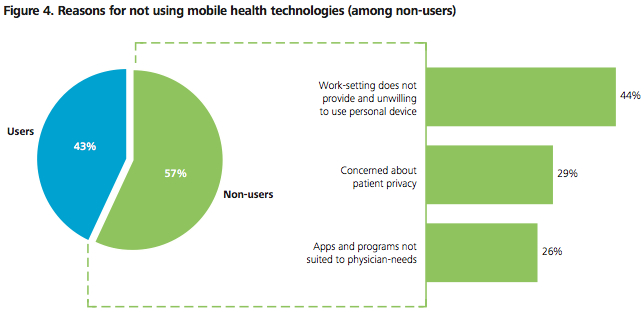 A recent survey by Deloitte found that 43 percent of doctors use smartphones or tablets for clinical purposes, which the firm suggested included EHR access, e-prescribing, and physician-to-physician communication. The study polled 613 physicians in the US.
A recent survey by Deloitte found that 43 percent of doctors use smartphones or tablets for clinical purposes, which the firm suggested included EHR access, e-prescribing, and physician-to-physician communication. The study polled 613 physicians in the US.
Of the 57 percent of physicians that do not use their mobile devices for clinical purposes, 44 percent said that their work doesn't provide mobile devices and they're unwilling to use their own, 29 percent were concerned about patient privacy, and 26 percent said the apps and programs available weren't suited to their needs. However, 22 percent of the non-users indicated a plan to use mobile health technology in the future.
The survey appears to exclude clinical reference apps, like Epocrates drug reference app, for example, from the "clinical purposes" category. It has long been the case that a majority of physicians in the US use mobile devices for looking up medical reference. Way back in 2010 a Chilmark Research study estimated that 63 percent of physicians were using health apps at the time, however, the majority were "clinical reference apps with no tie-in to an enterprise’s healthcare information systems," the report's author noted.
Harry Greenspun, MD, the Senior Advisor for Health Care Transformation & Technology at the Deloitte Center for Health Solutions (DCHS), told MobiHealthNews that one intention of the survey was to better determine how widely adopted mobile health technology was in the physician population and to capture the percentage of early stage adopters of physicians "doing really novel things, doing things differently in healthcare". Physicians had medical reference software on their PDAs years and years ago, he noted, and that change was just the difference between carrying around a physical paper-based book and an e-book version of the same text.

Deloitte's survey dealt with health IT adoption in general, not just mobile device use. The firm found that hospitals who had achieved Meaningful Use stage 1 with their EHR (about two thirds of the doctors surveyed) were more likely than those that hadn't to employ mobile and digital health technologies. For instance, 37 percent of physicians whose practice or place of employment had met MU Stage 1 requirements are communicating with patients by email or text compared to 27 percent of physicians at practices that have not met MU Stage 1 requirements. Twenty-six percent of Stage 1 practices offered online prescription refills vs. just 5 percent of non-Stage 1. For mobile consumer visit scheduling, test results and medical records access, or payment-making, the breakdown was 19 percent vs 2 percent.
In related news, a JMIR study of 115 medical residents at the University of Chicago published this month compared the "hype" of iPads (the expected use prior to the roll out) with their actual use. Before the roll out, 34 percent of residents strongly agreed that the iPad would benefit patient care and 41 percent strongly agreed that it would increase ward efficiency. Four months later, 15 percent strongly agreed it had benefitted patient care and 24 percent felt it had increased efficiency. Still, overall satisfaction with the iPads was high, with 84 percent of residents believing the iPad was a good investment for the residency program.


















